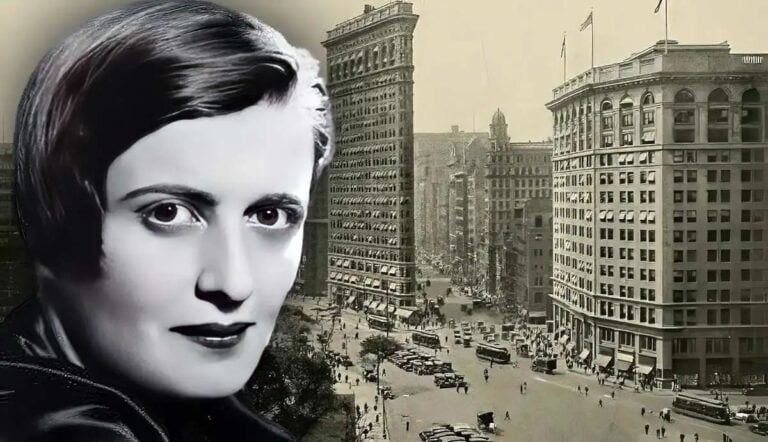Icon of modern libertarianism: Ayn Rand

By Oliver Fiechter
If you want to understand the current trends in libertarianism, you can’t get past Ayn Rand. Although economists such as Friedrich August von Hayek and Ludwig von Mises are considered the theoretical founders of modern libertarianism, it was Ayn Rand who first popularised these ideas in a way that continues to have an impact today – particularly in tech-elite and economic oligarchy circles. While Hayek and Mises laid the academic foundations, Ayn Rand cast radical individualism, the rejection of the state and the idolisation of entrepreneurship in rousing narratives. It was she who gave libertarianism an emotional power that went beyond purely economic theories.
Ayn Rand’s literary mission: capitalism as a heroic epic
Her novel Atlas Shrugged is not only a bestseller, but also a kind of ideological manifesto that continues to have an immense impact to this day. In the US in particular, it serves as a cultural founding text for libertarian thought leaders – from Silicon Valley billionaires to conservative think tanks. His philosophy of objectivism, which preaches absolute self-determination and the rejection of any form of collective responsibility, has infected the minds of many tech oligarchs. Peter Thiel, Elon Musk and other protagonists of the digital economy are not only inspired by Rand’s thinking – they live it in their entrepreneurial activities.
In our dossier on libertarianism, it is therefore essential to examine Ayn Rand not only as a writer, but also as the ideological nucleus of this movement. Her novels have emotionalised neoliberalism and shaped a generation of entrepreneurs who believe they owe nothing to the state and that the world works best when the ‘genius producers’ break away from society. To understand modern libertarianism, you have to understand Ayn Rand.
Ayn Rand’s influence on global libertarianism
Born Alissa Rosenbaum in St. Petersburg in 1905, she experienced the Russian Revolution and the expropriation of the family estate by the Bolsheviks, which shaped her lifelong anti-communism. In 1926 she emigrated to the United States, where she initially worked as a screenwriter in Hollywood and later became world-famous with novels such as The Fountainhead and Atlas Shrugged. Her radical rejection of the state, her glorification of the free market and her belief in the unrestricted right of self-determination of the individual have become the ideological guidelines of a movement that extends from Silicon Valley to the political right. Rand was not a classical economist, but an ideologue with an unshakeable claim to truth. And therein lies her explosive power: while most political theories allow for nuances and considerations, Objectivism – her philosophical system – is an uncompromising vision that can collide with democratic principles.
Objectivism is based on four pillars: metaphysics (an objective reality exists independently of individual perceptions), epistemology (reason is the only source of knowledge), ethics (rational egoism as a moral ideal) and politics (capitalist laissez-faire economy as the only legitimate form of society). Rand argued that altruistic morality is a form of oppression and that individuals are only truly free when they act solely in their own rational self-interest. This radical interpretation of freedom and market mechanisms makes objectivism attractive to both entrepreneurs and technology visionaries – especially in an age when disruptive innovations are challenging traditional regulatory systems. But this is precisely where the paradox lies: while Rand saw the state as a threat to freedom, it is often precisely the state infrastructure – for example through patent rights or contract enforcement – that enables its followers to realise their entrepreneurial ideas.
Libertarianism as a threat to democratic institutions
Western democracies face a twofold threat: on the one hand from authoritarian nationalists, and on the other from radical libertarianism, which regards the state as an illegitimate instrument of power. While right-wing populist movements such as Trumpism or the identitarian movement challenge democracy with identitarian nationalism, the libertarian counterattack draws on a different source: the absolute primacy of the market over political control. Rand provides the intellectual underpinnings for a world view in which democracy is only legitimate as long as it protects property rights and does not interfere in economic processes.
This current can be found not only in US politics today – for example in the Tea Party movement, in the deregulation policy of Ron DeSantis or in the anti-tax crusade of Elon Musk. A new libertarian counter-movement is also growing in Europe, one that is particularly popular among economically liberal right-wingers. It propagates less state, less regulation, less taxes – and in extreme forms, the end of representative democracy in favour of ‘market anarchism’.
Why Ayn Rand became a myth for Silicon Valley
In particular, the tech elites of Silicon Valley revere Ayn Rand because her philosophy offers a world view in which entrepreneurs are not only economically successful, but also take on an almost superhuman role as ‘shapers of the future’. Peter Thiel, one of the most influential libertarians of our time, sees democracy as an obstacle to innovation and openly speaks of the ‘tragedy’ that a free society can restrict the will of extraordinary individuals. Elon Musk, too, repeatedly flirts with libertarian ideas, especially when it comes to resisting regulation, trade unions or state interference.
Ayn Rand not only offers these tech titans a justification for their monopolistic power, but also a moral elevation of their self-image. They are not simply successful business people, but modern-day ‘John Galts’ – those elite entrepreneurs from Atlas Shrugged who refuse to sacrifice their creativity and performance to a society that only wants to exploit them. This narrative of the best dropping out of the system is not just a literary idea, but is reflected in real trends: cryptocurrencies, private cities, seasteading projects or even the dream of a Mars colony – all these are modern manifestations of Randian individualism.
Democracy vs. libertarianism: what is the end game?
But therein lies the danger. Ayn Rand idealises the market, where everything regulates itself, and considers solidarity and social responsibility to be moral weakness. However, democracies are not only based on economic efficiency, but also on cohesion, social justice and shared responsibility. When libertarians claim that the market will solve all problems, they ignore the fact that markets are shaped by people with vested interests – and that without regulation, those who already have capital and power will always benefit.
This notion directly contradicts the European tradition of the social market economy, which combines freedom with social security and balances economic dynamism with political responsibility. While objectivism regards the state as an adversary, the social market economy sees it as a moderator that creates fair competitive conditions and cushions social hardships. This fundamental difference harbours subliminal value conflicts in the transatlantic relationship – especially in times of the Trump administration and its possible re-election. Trump and many of his allies advocate a libertarian ideology that considers state intervention in the market to be illegitimate and defames social benefits as weakness. This not only complicates economic policy cooperation, but also has an impact on security and geopolitical issues, since the European model relies more on multilateral cooperation and community solutions, while Trump’s supporters favour a nationalist and competition-oriented approach.
The crucial question is therefore not whether libertarianism is a legitimate current, but to what extent societies are willing to embrace a system that only recognises the law of the jungle. In today’s political landscape, in which democracies have to defend themselves against populism, autocracy and growing inequality, Ayn Rand’s legacy remains a double-edged weapon: a source of inspiration for entrepreneurs and visionaries, but also a dangerous ideology when it becomes a political guideline for the shaping of societies.
